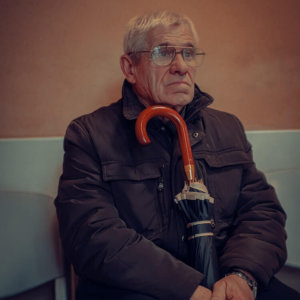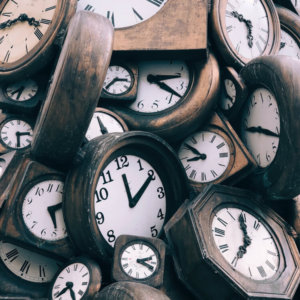How to Wait Without Losing Your Mind
 How to wait for something, especially the unknown, challenges even the most patient of people.
How to wait for something, especially the unknown, challenges even the most patient of people.
There is waiting…and then there is WAITING.
Waiting for a bus or for the abominably slow cashier to ring up all the grocery specials with coupons of the lady in front of you in line feels significantly different than waiting for the birth of a child, or waiting for news of a soldier at war, or waiting for someone to get off life support.
This last has been a recent personal wait and has inspired these reflections on how to wait without losing your mind.
The salient difference between a bus and life support is knowledge of the outcome.
We can be pretty secure in the knowledge that bus schedules are predictable…and if we miss this one we can take the next.
Waiting for the arrival of improvement after a catastrophic event has no timetable.
Some of the things I was waiting for were to
- hear news of change.
- see signs of life.
- watch nurses monitor more equipment than an air traffic controller.
- engage with a system that churns forward 24/7 while people wait. And wait. And wait some more.
Where are all the simple answers?
 Waiting creates many questions.
Waiting creates many questions.
Questions are simple. Answers are not.
When it comes to life and death there are no pat answers. Every conversation is bracketed with “in the best-case scenario….”
When I think about it, I tend to live my life with that perspective. In the best-case scenario, I will get up every morning, have food to eat, money to pay my bills, the love of family and fur friends, and meaningful work to do.
Apparently, I have little awareness that my day-to-day life is close to a line where everything could stop, or change direction in a blink.
That I can only live in this moment is the insight that comes from waiting.
The intimacy and power of strangers
 Strangers can be more intimate and have more power than I have ever allowed the closest of my friends and family. Who are these people who give their lives that others may live?
Strangers can be more intimate and have more power than I have ever allowed the closest of my friends and family. Who are these people who give their lives that others may live?
Long twelve-hour shifts…or even 24 hours for some doctors, with no guarantee that what they are doing will “work”. They take on risks of contracting disease, of emotional pain and burnout, of separation from their own families and personal desires. For what?
So that a total stranger may have an opportunity to live and breathe and see the beauty of another sunrise.
I shook the soft tender hands of a man who had placed those hands within the chest wall of my son, slicing into his heart. He watched when a valve failed and my son’s lungs filled with fluid. I can only imagine what he was thinking. Yet his hands never wavered.
He had a rescue plan.
Had that been me, I am not sure I could have moved forward with plan B…or plan C – with such steady hands and clear vision.
What is this power to reach for plan B? Where does this courage come from? Education? Experience? Preparation? Team? Practice? Grace!
The coexistence of strengths and weaknesses
 The third thing I learned as I sat and waited, is how strength and weakness coexist in the same body.
The third thing I learned as I sat and waited, is how strength and weakness coexist in the same body.
One moment I wanted to melt in a blob of tears, rail at the Universe, and relinquish all my dreams and goals.
The next moment, I moved to holding others, making plans for how to help my son on a long difficult road back to health, and resolving to tame the lions that crossed his path.
The mystery of time
 In my waiting, I learned that the experience of time is an enormous hoax.
In my waiting, I learned that the experience of time is an enormous hoax.
An hour can last three days, and a week may have only 24 hours from Monday to Friday.
When the primary activity is waiting, weekends are no different than Wednesdays.
There is no consistency in the amount of time between sunrise and sunset when what once moved is still — and everything I expect to be still is moving.
Clocks — an artificial creation of humanity — are loosely connected to reality, ticking away seconds that last hours. So how does one plan life when in an interminable wait?
The simple answer is, you don’t. Planning anything, whether that is the next meal or a career goal, is a fruitless exercise when the mind is simultaneously holding hope and grief in opposite halves of the brain.
Time comes and goes with multiple personalities. I can learn to live with that. And yet, what do I do with the piece of me that wonders when I should plan the next meal?
Other experiences of waiting
These are only a few of the things I experienced in this alternate universe of being an outsider to a medical crisis.
I also continue to stand in tides of sorrow and relief that roll in and out without any reference to the tug of the moon.
And an appetite that swings from craving cookies to fasting as a form of prayer, followed by Chinese takeout.
What does one do with unending time and without a compass or clock, menu, or roadmap?
I cannot speak for others, but I learned
- to pause — over and over
- to give thanks for moments of stillness,
- to treasure the soft tenderness of a caregiver
- to list all I am grateful for
- to breathe and feel the air
- to listen for sounds of gentle laughter in the distance
- to interface with many kind people
I learned – and continue to learn — a new meaning to ‘wait’ as I cling to the promise of the sunrise that is sure to come after the dark of the night.
I just don’t know when.
Or what.
Or why.
And that is OK.
[Photo credits from Unsplash: Waiting by Alberto-Barbarisi; questions by ozan-safak; doctors-national-cancer-institute; time-jon-tyson; strength-and-weakness-janko-ferlic]
NEVER MISS A POST FROM TheReflectivePen.


Judith Guertin
Pausing is very powerful, especially when feeling overwhelmed. Until we find ourselves in the circumstances you have just been through, we may not give it a second thought. I am glad to know you are seeing positive signs for your son’s health.
Ardis Mayo
Yes, pausing is so simple, we often discount the moment it takes as a distraction instead of a powerful healing and grounding step.
Terrie Mourningdove
Thank you for this Ardis. Waiting is such a huge part of our life experience in so many different ways. The one you just experienced is one of the hardest ones. I don’t think there is one simple answer for how to get through it so I appreciate all of the different ways you shared that helped you.
One of the things that helps me, especially when I am waiting in a Doctors office for an appointment on occasions that I have arrived at the office before the Doctor did, is to say to myself: ‘Perhaps this is the moment you were born for” from Esther 4:14.
And the quote that applies to almost all times of waiting for me is from Rumi: “Anything you do every day can open into the deepest spiritual place, which is freedom.”
Thank you for all the ways your words help me on my journey Ardis. I will pray for the continued healing of your son. Many Blessings Always.
Ardis Mayo
Thank you for the quotes – especially the one from Esther 4:14 for it brings answers to one of life’s deepest questions. When we pass on words of support and prayer as you have done it is like seeding the world with love…and it is exciting to see all that springs forth. Thank you.
Della
Ardis, thank you for sharing your “waiting” experiences, and allowing me to gain insight from your difficult time. I pray that your son’s recovery may be swift and successful.
Ardis Mayo
Thank you for your prayers. It is in the sharing of our brokenness and losses that we bring healing/insights to each other. My purpose is to encourage others to use their stories and their voices to bring this healing.
Judith Scarborough
Dear Ardis, thank you for this naked look into your experience of fierce mother love as you walk with Andy on this journey through illness and back to life. Your courage and concern and love are so evident and am sure “all will be well, and all manner of things will be well.” Bless you and those you live, my friend. ?
Ardis Mayo
Thank you for the blessing, Judith and the wonderful quote of Julian of Norwich.
Francisca
I can feel your tender heart beating, Ardis, with hope, with despair, with anticipation, yet without expectation. So much to take in as you learn your hard lessons about waiting and share them with us. Gentle hugs and wishes that soon the waiting is completely over for you and you can safely fully live in the moment where there is no waiting.
Ardis Mayo
Your hugs and wishes are greatly received, filling my store to pass on to others. I failed to add living in the moment as another way to successfully wait. thank you.
Janet T
Thank you, Ardis. Sharing this intimate part of your life has been a great blessing for me as I do my own waiting on a much smaller scale. You’ve put it in perspective and given me some tools.